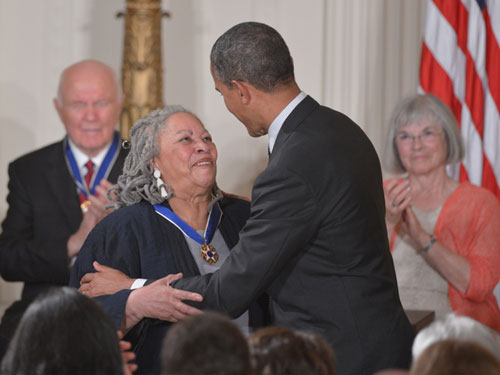Quotable: Toni Morrison

Earlier this week, Toni Morrison was awarded the Presidential Medal of Freedom at a ceremony in the White House. In his remarks, Barack Obama mentioned that he read Song of Solomon not just to learn how to write, but also “how to be.” Song of Solomon is one of my favorite of Morrison’s novels. And it struck me that it often uses repetition as a stylistic device, which is something that Obama does a lot in his speeches. So I thought I’d excerpt two short paragraphs from the book, both of which use repetition masterfully. Here is a passage from early on in the book, describing Macon Dead’s car:
In 1936 there were very few among them who lived as well as Macon Dead. Others watched the family gliding by with a tiny bit of jealousy and a whole lot of amusement, for Macon’s wide green Packard belied what they thought a car was for. He never went over twenty miles an hour, never gunned his engine, never stayed in first gear for a block or two to give pedestrians a thrill. He never had a blown tire, never ran out of gas and needed twelve grinning raggle-tailed boys to help him push it up a hill or over to a curb. No rope ever held the door to its frame, and no teenagers leaped on his running board for a lift down the street. He hailed no one and no one hailed him. There was never a sudden braking and backing up to shout or laugh with a friend. No beer bottles or ice cream cones poked from the open windows. Nor did a baby boy stand up to pee out of them. He never let rain fall on it if he could help it and he walked to Sonny’s Shop–taking the car out only on these occasions. What’s more, they doubted that he had ever taken a woman into the back seat, because rumor was that he went to “bad houses” or lay, sometimes, with a slack or lonely female tenant. Other than the bright and roving eyes of Magdalene called Lena and First Corinthians, the Packard had no real lived life at all. So they called it Macon Dead’s hearse.
The repetition of the adverb “never” obviously emphasizes how little use Macon Dead makes of the car, but it also informs us about the multiple uses other people in his community might have made of it. Halfway through, the switch from “never” to “no” highlights the fact that the car, like its owner, lacks a certain essence, a kind of vitality. All of which leads us to its funny, and appropriate, nickname: “Macon Dead’s hearse.”
Now, toward the end of the novel, Macon Dead’s son returns to Montour County to learn more about his deceased grandfather, who was also named Macon Dead. And, here, Toni Morrison uses the same device, but for the opposite effect. This is a description of the farm that the elder Macon owned:
A farm that colored their lives like a paintbrush and spoke to them like a sermon. “You see?” the farm said to them. “See? See what you can do? Never mind you can’t tell one letter from another, never mind you born a slave, never mind you lose your name, never mind your daddy dead, never mind nothing. Here, this here, is what a man can do if he puts his mind to it and his back in it. Stop sniveling,” it said. “Stop picking around the edges of the world. Take advantage, and if you can’t take advantage, take disadvantage. We live here. On this planet, in this nation, in this county right here. Nowhere else! We got a home in this rock, don’t you see! Nobody starving in my home; nobody crying in my home, and if I got a home, you got one too! Grab it. Grab this land! Take it, hold it, my brothers, make it, my brothers, shake it, squeeze it, turn it, twist it, beat it, kick it, kiss it, whip it, stomp it, dig it, plow it, seed it, reap it, rent it, buy it, sell it, own it, build it, multiply it, and pass it on–can you hear me? Pass it on!”
Though the sentence starts familiarly with the repetition of “never,” it doesn’t speak of what never happens, but of what people should never mind happening. It isn’t about absence, it’s about presence and power. And then other syntactic forms are repeated: the demonstrative (“this nation, this county”) and the imperative (“take it, hold it”), for instance, to emphasize that power. The beauty of the two passages is how, through the description of two simple possessions, the car and the farm, we get two portraits of two very different Macon Deads.
Photo credit: Mandel Ngan/AFP/Getty Images